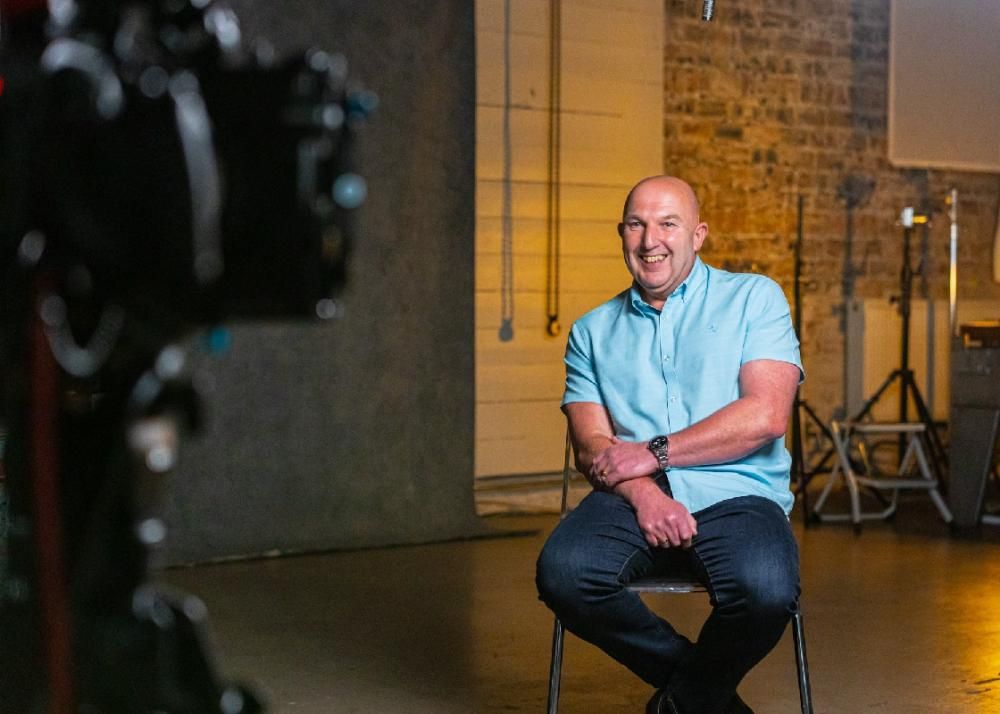Stuart’s story
My name is Stuart. I’m 59 years old. I have been happily married for the last 18 years and live well with a diagnosis of Alzheimer’s disease.

Dementia is one thing about me, it’s not everything
I was working at a job I thoroughly enjoyed. My wife and I had been fortunate, we’d had good jobs and good health and we enjoyed travelling across the world.
It wasn’t a sudden thing, but a pattern that emerged over time. I started to notice things at work, I’d answer the phone, take a message and then not be able to remember who I’d spoken with. Or I’d go to a course and find it tricky to recall details of what had been presented. One day, I went to write something down – I had paper and a pen in my hand, but I couldn’t get anything onto the page. Then I started having severe headaches. I’d never suffered with headaches in my life, so it was noticeable. It was debilitating – I’d come home from work and rather than go to the gym, I’d go straight to bed for a rest.
It was my wife who made the appointment with the doctor. I can vividly remember when he called to speak to me – it was a Monday night at six o’clock. We ran through some of the things that had been happening and then he asked, “is there a history of dementia in the family?” “Yes”, I said, “there is.” I had to sit a round of tests and then I was referred for a scan. We were both optimistic that all would come back clear, I hadn’t seriously considered that it might be dementia – not at my age.
While we waited for my results, life continued. We went on holiday, enjoyed days of sight-seeing and relaxation. We’d read our Kindles in the evenings, sitting outside a pub, enjoying the atmosphere. Yes, I had to re-read the pages from the night before – but only to get a thread. I still didn’t think dementia had any part to play.
In January 2022, when I finally received my diagnosis, I had mixed emotions. On one hand, I felt like my life was over, but on the other I was relieved because I now understood what was wrong. My doctor was tremendous and explained everything, he showed me scans and talked me through the part of my brain that is affected. Then he gave me a pep talk. I wrote it down and still refer to it to this day. He said, “You must have a focus. You must have a routine. You must keep motivating yourself. You must still try to do things that you struggle with. Go out and live your life.”
If it hadn’t been for that doctor, I think I would have found it hard to move on as quickly as I did. Some of my peers tell me that they struggle to accept their diagnoses, but I say, “you need to try – because the reality is, we can’t beat this, but we can give it a good fight. We can give it a good run for its money. But you’ve got to accept your diagnosis first.”
That’s not to say things haven’t been hard at times. I’ve certainly got a few stories to tell! For example, one day I was preparing dinner, standing there with a potato peeler in my hand and I didn’t have a clue what to do with it. I said to my wife, “I don’t know how to peel the potatoes, you’ll have to show me” So, she showed me, we had a laugh about it and then I went onto practice peeling potatoes every day for the next week. So yes, you do get frustrated, but we decided early-on that it doesn’t matter what happens, we’ll try and have a laugh at my ‘blips’ because it’s happened now, we’re not going to undo it so what’s the point of getting upset? If you can have a wee laugh, you can move on.
I’ve learned that my life has changed, but it isn’t over. My wife and I have always loved to travel, and we still do – far and wide. I have a bucket list that I have every intention of ticking off. We recently returned from a fabulous cruise around South America, and I enjoyed creating a blog to document what we saw and how I felt being on such a big trip while living with dementia. Next on our list is Sicily, then we’re off to Alaska in the summer and Thailand later in the year.
Dementia won’t hold me back. We used to book a couple of years ahead, but we make shorter-term plans now. Planning for the next few months gives us enough to look forward to. Then we’ll re-evaluate and hopefully do the same again. I also joined the Scottish Dementia Working Group in November of last year. When I learned what the focus of the group was, I said, “absolutely, this is for me.” Since then, I’ve been an active contributor. I treat that as my work now. I get involved in as many meetings, events and activities as I can – it gives me purpose, direction and a focus.
My overarching message is that you can live well with dementia. You can still do most things that you could do before. I couldn’t use a potato peeler and only last week, I was using a chainsaw! Although I still miss work terribly, the annoyance, resentment and frustration has gone. It is nice to reflect on things, but I don’t dwell too much. My faith helps too, I’ve accepted that this is the chosen path for me, and I’ll be steered through it. My life goes on.